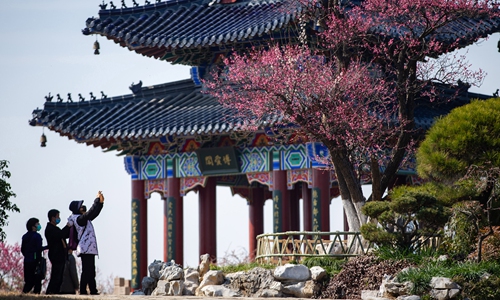
Tourists take photos of plum blossoms at Meihua Mountain in Nanjing, East China's Jiangsu Province on Thursday, when the mountain park began to open to tourists. Tourists have to wear masks and have their temperature checked before entering. Photo: cnsphoto
China's tourism industry, which has been hit hard by the outbreak of the novel coronavirus pneumonia, or COVID19, is cautiously resuming operations under the policy guidance of local authorities that are struggling to push the economy forward.
The Culture and Tourism Bureau in Lijiang, Southwest China's Yunnan Province, announced that the city's tourism sector fully resumed operations from Thursday, since it saw no new coronavirus cases for 18 consecutive days.
The tourism city is known for its beautifully preserved Old Town of Lijiang, a UNESCO World Heritage site.
Tropical resort Sanya in South China's Hainan Province also announced the city's A-level tourist attractions will resume operations starting from Friday.
Nanjing in East China's Jiangsu Province said it will open scenic spots in different batches, but the density of people will be controlled.
East China's Zhejiang and Shandong Provinces and Southwest China's Sichuan Province have also issued new policies to promote the resumption of production and reopening of tourist attractions.
Tourists are also coming back. The renowned West Lake scenic area in Hangzhou, East China's Zhejiang Province, saw 1,900 and 3,900 people visiting its paid areas on Wednesday and Thursday, the first and second days of the area reopening its paid attractions after a 36-day closure amid the virus' outbreak.
The scenic area has reopened 16 of its 18 paid attractions, said Wang Xiaobin, a staffer with its management committee. "The remaining two are indoor venues with relatively high risks of virus infection," he told the Global Times Friday.
West Lake makes it compulsory for tourists to wear masks during their visit, Wang added. Everyone will take temperature checks when entering the paid attractions.
To avoid possible virus transmission, the scenic area currently rejects tour groups with over 30 members. "We have also increased the frequency of disinfection, especially for the most-used facilities like toilets," Wang said.
Zhejiang Romantic International Tourist, a travel agency based in Zhejiang's Wenzhou, one of the cities with the most confirmed infection cases outside of the epidemic epicenter Hubei Province, has received a few orders since some local tourist attractions gradually reopened this week.
The number of orders is "not many," said the agency's general manager Li Zhirong, who declined to provide a detailed figure. "The majority of our clients at present are individuals instead of tour groups," she told the Global Times Friday.
Li is nonetheless optimistic about the future since confirmed cases of the virus are declining and the weather is getting warmer in Zhejiang, which is suitable for residents to go out.
"I estimate that our business will return to the level of the same period last year by the end of March," she added.
Industry players are waiting for a full rebound after an almost standstill during Spring Festival holidays, which should have been the high season of the tourism sector.
According to a forecast from the China Tourism Research Institute, tourism revenues in the first quarter of 2020 posted a year-on-year negative growth of 69 percent and the number of domestic tourists in the sank 56 percent.
Throughout the whole year, tourism revenues will reduce by 1.18 trillion yuan ($167.6 billion) and the number of domestic trips by 932 million, said the institute.
However, a full rebound still needs time as most domestic tourism agencies have not yet restarted operations yet.
"We are still waiting for the approval from relevant departments to restart our businesses," Xu Xiaolei, manager of marketing at China's CYTS Tours Holding Co, told the Global Times on Friday.
The company's business has been halted since January 27, according to Xu.
"Preparations are still being made to resume business, including training, financial management, and product design," Xu said.
Consumers are also holding a cautious attitude.
"Even if the tourist area is open, I still dare not go," a Beijing resident surnamed Huang told the Global Times on Friday.
"But does the reopening of tourism attractions mean that the epidemic control has been effective? I really want to go out for a walk," Huang said.


